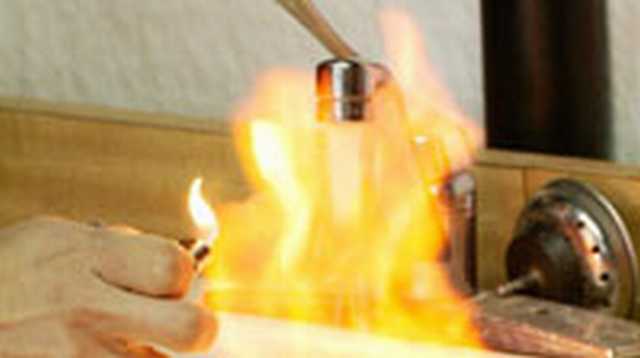
In a scene from the Academy-Award nominated documentary GasLand, a Pennsylvania resident ignites the water flowing from his kitchen tap, a trick he could not perform before natural-gas fracking came to a field near his.
A new study published by the National Academy of Sciences belies industry assurances that they can retrieve natural gas by hydraulic fracturing without affecting adjacent water supplies. The report provides more evidence that what industry ads portray as a safe source of abundant energy via new technology may in fact be an unacceptable tradeoff between the fossil fuel we want and the water we need.
The bottom line from the Duke University researchers: “we document systematic evidence for methane contamination of drinking water associated with shale gas extraction.”
Brought to us by the folks at Halliburton, and specifically exempted by the Cheney White House from the provisions of the Safe Drinking Water Act, hydraulic fracturing, or “fracking” in the vernacular, involves drilling down a thousand feet or so into a shale formation and injecting, under enormous pressure, a blast of water, sand, and dozens of noxious chemicals. The combination blows apart the brittle rock and releases the natural gas trapped in it.
The advent of this “new technology” has spurred boasts of a Saudi Arabia of natural gas, a hundred-years supply, progress toward energy independence with “clean-burning” (oxymoron alert!) natural gas — a new energy era for America. Oh, and did we mention that it’s perfectly safe? That nothing can go wrong?
Except when you hit pressurized gas you didn’t know was there and you have a blowout, possibly along with an explosion and fire. Or when you dump your millions of gallons of wastewater at an accommodating sewage-treatment plant that has no idea how to remove the chemicals you’ve used or the radiation you’ve dredged up from far below ground. Or if the gas you release and push around blindly, a thousand feet down, finds fissures and channels to the surface you didn’t know were there and blows up someone’s house. Or contaminates someone’s well.
The industry insists that the nearby aquifers are safe because they operate far below them. But they often have to drill though them to get below them. And they do not know what natural channels, fissures and connections there may be, nor do they know the locations of the thousands of previously drilled and subsequently abandoned old-fashioned gas wells. Nevertheless, the industry stands ready to risk our water for their profit.
Belatedly, scientific investigation is catching up with the gas industry’s fervor to drill, baby, drill. The current study sampled water from wells in Pennsylvania and New York. They found methane (natural gas) traces in almost all the wells they tested, regardless of their proximity to gas wells, but the levels in water wells close to fracking operations were, on average, 17 times higher.
The report concluded that “greater stewardship, data, and possibly regulation are needed to ensure the sustainable future of shale-gas extraction and to improve public confidence in its use.”
More than that, we need to decide whether to accept the ever more extreme risks that industry is willing to take in order to maintain their profits and our cheap-fuel gluttony. If profits and continued consumption are the only considerations, then we need to learn to burn water and drink gas.
[For updates on this and other stories, check out the Editor’s Log.]
See Also:
Are You Fracking (and) Kidding Me?
Natural Gas Getting Fracked Over
New York Bans Fracking for Natural Gas
60 Minutes on Natural Gas: A Couple Minutes Short
EPA to Halliburton: Raise Your Right Hand
The electronic and print ads for natural gas make it sound like the perfect solution for our energy woes. To me it appears to be another case where our so called “mainstream media” journalists are failing to investigate and report facts to the public so people can make informed decisions. I must confess, I hadn’t really thought too much about it and the potential pollution implications are new to me.
Mike
To be fair, we’d probably need to make a distinction between ads and journalism, blurred though it may sometimes be these days. They have the advertising field to themselves because no farmer with a polluted well can afford to buy time on the CBS Evening News. But it’s different in journalism. The investigative journalists at Pro Publica have been hammering on the frackers, and 60 Minutes did a reasonable job of portraying the downside. You’ll want to look into the pollution implications, Mike, because I happen to know there’s a fracking well located about five miles from your well.